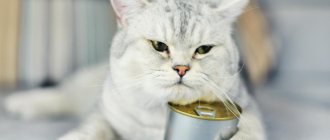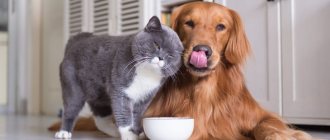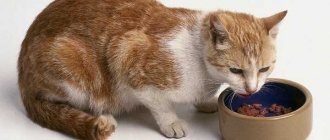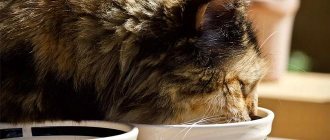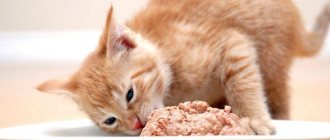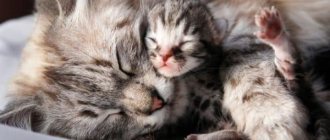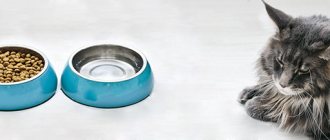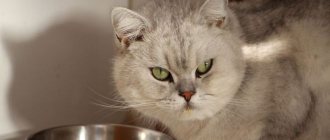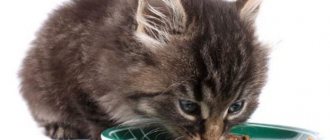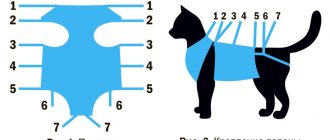What types of hair do cats have?
Together with the selection of breeds, today the coat of cats varies from completely hairless Sphynxes to smooth-haired Orientals, from domestic shorthairs to longhaired cats with truly silky fur, while some cat breeds practically do not shed.
Some cats that live in cold climates, especially in open areas, have two heavy seasonal sheddings per year (spring and late fall), during which entire clumps of undercoat may fall out. However, many cats in our homes shed lightly almost all year round.
The best vitamins for cat skin and coat
Vitamins “Phytomins” from a domestic manufacturer are suitable for restoring fur in British cats. They contain brewer's yeast, plant extracts, mineral supplements, collagen, taurine and sulfur. Noticeably improves hair growth, strengthens roots, and prevents hair loss. The drug is produced in the form of granules. Can be used for a long period.
Beaphar Kittys Mix is considered a good vitamin for cat fur. This is a complex of vitamins in the form of a treat with different flavors. The product contains all the necessary vitamins for a pet’s healthy coat, as well as a number of microelements. The drug restores the cat's coat, prevents hair loss, improves vision and functioning of the cardiovascular system, and strengthens the condition of the pet's claws and teeth. Among the disadvantages, the increased sugar content is noted.
FeliDerm vitamins from a German manufacturer are designed for the fur and skin of cats during shedding. They also solve more serious problems - allergies, metabolic disorders, hormonal disorders. The composition includes biotin, Omega-3, amino acids, zinc, brewer's yeast. The complex has natural ingredients: algae, flour, meat, liver, egg, whey. The drug relieves skin itching, prevents hair loss, has good taste, is used very economically, but buyers note its high cost.
The drug "Canina Canivita" is produced in the form of a tonic. Suitable for cats of all ages. The effect of using vitamins occurs in the shortest possible time, since the product immediately enters the bloodstream. Recommended for cats with thick, long hair. After a course of treatment, it becomes smooth, stops pilling, acquires shine, and excessive hair loss stops. The drug relieves inflammation of the skin and eliminates itching. In addition, vitamins well regulate the animal’s sexual cycle. The disadvantages include the bitter aftertaste of the drug.
Vitamins "Doctor Zoo" can be used in different forms of nutrition. They contain all the necessary vitamins, as well as phosphorus, potassium, manganese, zinc, and copper. Thanks to the content of taurine and biotin, the condition of the skin and coat is quickly restored, and metabolism is normalized.
“Laveta Super For Cats” is a vitamin complex for cats taking part in exhibitions, including the Scottish breed. Contains vitamins B, E, as well as taurine and biotin, which provide your pet with shiny, healthy coat and skin.
“TM Excel Brewers” - vitamins for those cats with intense hair shedding. Cats change it twice a year. To make the molting period more comfortable for the animal, it is imperative to give the pet vitamin complexes. This preparation contains fatty acids, all essential vitamins and microelements, and extracts of some plants. They prevent dandruff, hair loss, and eliminate hair fragility.
Vitamins "Radostin" from a domestic brand are suitable for sterilized cats against hair loss. Neutered animals also need special care and feeding. The drug contains multivitamins and prebiotics. Indications for use include nutritional problems, hair loss, and preventive measures.
It is worth noting the drug Malta paste. It contains malt extract, oils, fatty acids, and plant products. Designed to remove lost hair from the digestive tract. It has a pleasant taste, effectively combats hair loss, and minimizes seasonal shedding in animals. Available in tubes.
Important! In the process of taking vitamin preparations, it is necessary to carefully monitor their effect on the cat. The products can lead to allergies and other negative reactions in the pet’s body.
How does a cat's diet affect its fur and skin?
The skin is the largest part of the body, and skin cells change very quickly. Most pets have almost all their skin covered with hair and change it several times a year. To maintain healthy skin and coat, your cat needs a balanced diet that contains easily digestible proteins, carbohydrates, fats, minerals and vitamins, and provides the appropriate amount of calories to meet all of the cat's energy needs.
If nutrients are poorly absorbed, not only will they be unavailable to meet the body's needs, they will put undue strain on the liver and kidneys, which are supposed to eliminate indigestible waste. The ideal diet should be individualized and suitable for the cat's specific age and health. A high-quality and balanced diet is usually the key to a good and beautiful coat. A cat whose diet is not sufficient to meet her needs will have a dull, dry coat with increased shedding.
What vitamins does a cat need for a healthy coat?
Before the era of Whiskas, Darling, Kitekat and other feline culinary delights, cats for the most part (especially those living in rural areas) ate more natural food. They did not disdain small rodents, fresh fish, or a gaping sparrow. Eating their prey with appetite, they received all the necessary microelements.
Of course, modern food for domestic cats includes many important nutrients and vitamins, but, like people, pets have their own characteristics. Some of them need additional nutritional supplements.
Ready-made complexes containing biotin, amino acids, and fat supplements help cats balance their diet. Vitamins B and H are of particular importance for them, improving the metabolic process of skin tissue.
Biotin (as vitamin H is called) was discovered in 1931. Scientist P. Györdem isolated it from egg yolk. More than a century ago, the curious ability of egg yolk to restore the skin and fur of animals was established. If a cat has enough biotin in her body, then she becomes the happy owner of a shiny, velvety coat. She practically does not lose hair, she is happy with her life and looks great. In addition, biotin accelerates the healing of injuries and promotes full carbohydrate metabolism.
So, biotin:
- accelerates metabolic processes in the skin and muscles
- improves regeneration in case of injury
- makes the animal's fur thick and shiny
- strengthens the nervous system
- helps improve metabolic processes
- serves as a preventive measure for various diseases
The discovery of the past millennium has not lost its relevance to this day. To have beautiful skin and fur, it is difficult for cats to do without this vitamin. In natural foods, the most biotin is found in the yolk of a chicken egg, in bovine heart, in pork and beef liver. For cats, there is a considerable list of vitamin supplements and food with biotin.
This miracle vitamin, which provides cats with thick and shiny fur, is available in the following supplements:
- "Sherstevit"
- "Farmavit Neo"
- "Brewers Yeast With Garlic"
- "Radostin"
Biotin is also found in the following food groups:
- squid, crab, sardines, shrimp • milk and cheese, beef, veal
- carrots, spinach, soy, peanuts, yeast, cauliflower
- mushrooms, onions, tomatoes, carrots
What role does medicine play in ensuring a cat’s healthy coat?
Illness or stress, especially the chronic form, will affect the appearance of your pet's coat, its shine and texture, and many cats shed much more when they are stressed. The most common diseases that affect a cat's coat are hormonal imbalances, metabolic problems, digestive disorders such as diarrhea, parasites, both internal and external, and cancer. Even arthritis and obesity can cause skin problems if the cat is unable to groom itself properly.
Many skin conditions affect the shine and appearance of your pet's coat. Allergic skin diseases and seborrhea cause itching and changes in normal sebum secretion, which also leads to excessive shedding or even patchy hair loss.
If your cat's skin or coat problems are caused by a medical condition, the overall condition of both the cat's coat and skin often improves dramatically once the disease has been treated or brought under control.
Grooming
An adult cat in good health cleans its own fur, sometimes licking itself for several hours a day. However, the owner’s task is to help her get rid of fallen hairs and emerging impurities. This will require brushing and bathing procedures.
Combing helps solve 3 problems at once:
- Improve skin blood circulation and coat appearance.
- Prevent the formation of tangles - matted dense lumps of hairs that have fallen out and become entangled in the fur.
- Relieve your cat from having to swallow and then excrete a large amount of hair.
The frequency of the procedure depends on the breed.
- Short-haired cats with or without undercoat (Abyssinian, Siamese, Burmese, British) are brushed several times a week using brushes or a special mitten.
- Long-haired cats are combed daily or once every 2 days, devoting up to 1 hour to the procedure. At the end, the wool is lightly fluffed with a brush, and combed upward on the neck to form a beautiful collar.
For combing, you need brushes with natural bristles or slicker brushes, combs with sparse, non-sharp teeth, tangle cutters (if necessary), a “stroker” - a wide flat brush for combing the tail of long-haired cats, a special mitten, a piece of silk or suede. Combs are used as the tooth frequency increases. That is, you need to start the procedure with a sparse comb and end with a thick brush.
First, the sides, neck and back are combed, then the “pants”, belly, and tail. Finally, you can pet the cat with hands moistened with water to collect any remaining uncombed hairs. Short-haired cats can also be wiped with a piece of silk or suede cloth - this will add shine to your pet's coat.
You should wash your cat as needed, taking into account the characteristics of the breed. For example, hairless cats are washed once every 1-2 weeks, while smooth-haired cats can be bathed once every six months during shedding. For the procedure you will need:
- towel;
- basin with warm water. Some owners prefer to bathe their cat in a bathtub or sink;
- shampoo for cats.
It is better to choose shampoos from professional series adapted for home use. For example, “Elite” for deep cleaning of wool. The product combines a mild detergent complex and an exclusive composition of amino acids, vitamins, proteins and natural plant extracts. The shampoo gently but thoroughly cleanses the coat, makes it easier to comb, helps prevent dandruff, brittleness and tangling of the coat, and adds shine and silkiness.
When swimming, follow a few rules.
- The water should be at a comfortable temperature for the cat (36–38 °C).
- Bathing is carried out before meals or no earlier than 4 hours after meals.
- You don't need to immediately put your cat in a basin or bathtub of water, because it may get scared. It is better to wet the wool gradually from the ladle.
- Rinse off the shampoo thoroughly.
- While washing, talk to your pet in a gentle and encouraging voice and stroke it.
- Keep shampoo and water away from your cat's eyes, ears, nose and mouth.
- When drying wool, do not allow the temperature in the room to drop or drafts.
How important is regular grooming to ensure a cat's healthy coat and skin?
All cats benefit from regular coat brushing, which removes old hairs and dead skin cells, keeping the coat free from dirt and external parasites. Cats with long, silky, and curly coats need daily brushing to keep their coats free of tangles, especially around the ears, armpits, and along the back legs. Short-haired cats also need brushing, but less frequently.
Daily brushing also reduces the amount of hair your cat may ingest while grooming itself. Another benefit of brushing your cat daily is the dramatic reduction in the amount of hair and dander that can be scattered throughout the house. For some people with mild cat allergies, daily brushing can reduce the allergens enough that they can comfortably share their home with such a cat.
Regardless of coat type, you should check your cat every day for mats, which may form behind the ears, in the groin, or in the armpits. If you check your cat's fur and skin regularly, you will also have a better chance of catching any lumps, lumps, or tumors on her body early.
Vitamins and supplements for British cats
Round-cheeked British cats, similar to toy teddy bears, captivate with their good nature, aristocracy and devotion. Their owners love them for their independent character and cleanliness. The British are generally strong and resilient. Yet, like other cats, they need care to maintain mental and physical health.
Depending on the length of their coat, they are divided into two types: short-haired and long-haired.
In order for a little Briton to grow up strong and healthy, his diet must contain all the necessary substances.
The pharmaceutical industry produces drugs designed to enrich the nutrition of British cats.
Vitamins and supplements for British Shorthair cats:
- “Gimpet” contains only natural products, as well as vitamins, biotin and nutritional supplements that give the coat a well-groomed appearance.
- "Canina" - contains minerals and useful substances: taurine, carnitine and vitamins.
- “Canina Cat Mineral” - in addition to vitamins, the composition contains a high calcium content.
- “8 in 1 Brewers Yeast” - the complex includes fatty acids, zinc, amino acids, brewer’s yeast, and vitamins.
[Show slideshow]
Vitamins and supplements for British Longhair cats:
- Zoomir “Super Wool” is recommended for long-haired British cats for the prevention of skin and stomach diseases. Contains brewer's yeast, taurine, biotin and zinc. Accelerates hair growth.
- Phytomines are used to prevent molting, regardless of the season. Contains a whole bunch of useful substances: calcium, zinc, burdock root, nettle extract, brewer's yeast. If small kittens are given 12 tablets in a timely manner, and adults 23 tablets twice a day, then these measures will help protect them from such troubles as hair loss.
How often should you bathe or wash your cat?
Most healthy adult cats are finicky and rarely need a bath. The frequency of bathing your pet may need will depend on his age, lifestyle, and any health problems. For example, an older cat with arthritis who has difficulty grooming himself may need fairly regular baths. If your cat has skin allergies, your veterinarian may prescribe bathing with a medicated shampoo as additional therapy.
Cats should only be washed with shampoos that have been specifically formulated for them, as their skin has different thicknesses and a different ph than human skin, so even baby shampoo may be too harsh for their skin. Since all cats lick themselves vigorously after bathing, it is extremely important to completely rinse off any detergents and shampoos to prevent your pet from ingesting them, otherwise it can lead to digestive upsets and other harm.
Veterinarian advice
The opinions of experts boil down to the fact that animal hair often falls out regardless of the time of year and molting period. For them, this is a reason to prescribe treatment. Reviews from veterinarians about vitamins for cat fur speak in favor of the drugs.
To prevent hair loss in cats, veterinary specialists recommend:
- Regularly brush your pet’s fur with special brushes;
- use shampoos with the right pH to bathe your cat;
- adhere to the correct feeding regimen for your pet;
- add vitamins and microelements to the diet;
- do not feed your pet from the common table;
- clean the cat's litter box in a timely manner;
- Vaccinate the animal in due time.
You should only bathe your cat if it is heavily soiled and cannot be removed on its own.
Why might a cat have fur problems at certain times of the year?
Some cats may suffer from skin irritation associated with low winter humidity in our homes. Other cats are allergic to tree and plant pollen - this problem is especially acute in the spring. And another group of cats are allergic to fleas or other insects, where even one bite can cause a rash and hair loss.
If you bathe or groom your cat and she quickly develops fur or skin problems again, you should take her to a veterinarian for an examination. Sometimes skin problems such as rashes, itching, a lot of dandruff, increased shedding, oily fur or an unpleasant odor can indicate a serious illness. In many cases, the disease can be easily diagnosed and treated, but sometimes diagnostic problems arise and you may need to see a dermatologist.
The main takeaway is that the appearance of your cat's fur and skin are the first indicators of possible health problems. A healthy animal does not shed excessively, and there should be no dandruff or oiliness on the top layer of fur.
Traditional methods against hair loss
Guided by the desire to provide your pet with useful vitamin complexes, you should not neglect folk remedies, which are often not inferior in their effectiveness to officially recognized medications.
For example, the raw yolk of a regular chicken egg, fish oil, fresh grass and a balanced diet are excellent alternative remedies for hair loss in pets.
- Egg yolk is the leader in biotin content, which makes the skin and coat of cats thick and shiny. At the same time, the nervous system is strengthened and resistance to many diseases increases. When giving your pet a yolk, it is important to make sure that it does not include protein, which interferes with the absorption of biotin.
- Fish oil contains Omega-3 fatty acids. vitamins A, D, E., as well as organic compounds of iodine, phosphorus, sulfur and bromine. Thanks to its properties, fish oil maintains a healthy and well-groomed appearance of the animal’s skin and coat. It helps kittens grow healthy and strong, increases cats' resistance to infections and allergic skin diseases, regulates the exchange of calcium and phosphorus in the body, and is also necessary for the processes of bone tissue formation.
- Fresh grass is an important additional source of vitamins and microelements. Hair periodically accumulates in the cat's stomach, which she combs out with her tongue. Clumping into tight lumps, the wool is not digested and cannot be removed from the stomach on its own. This can lead to pain and intestinal obstruction. Fresh grass helps cleanse the stomach. Blades of grass swallowed by a cat cause vomiting. This removes hairballs from the stomach. Some plants (including indoor plants) can be poisonous to cats, so grass for them should be purchased at pet stores or grown yourself from seeds purchased there.
- A balanced diet is the most important component of success in caring for a pet. If the cat’s nutrition is organized correctly, and all useful supplements and vitamins are properly balanced, its thick fluffy coat will only evoke admiring glances. Even though a cat lives under the same roof as a person, it cannot eat from the same table with him. Additives and seasonings in human food can cause dermatitis and other serious problems in a cat. Fluffy pets need special food containing all the necessary nutritional and beneficial ingredients. Vet pharmacies will help you correct your cat’s nutrition, where you can purchase all the supplements necessary for its normal development.
